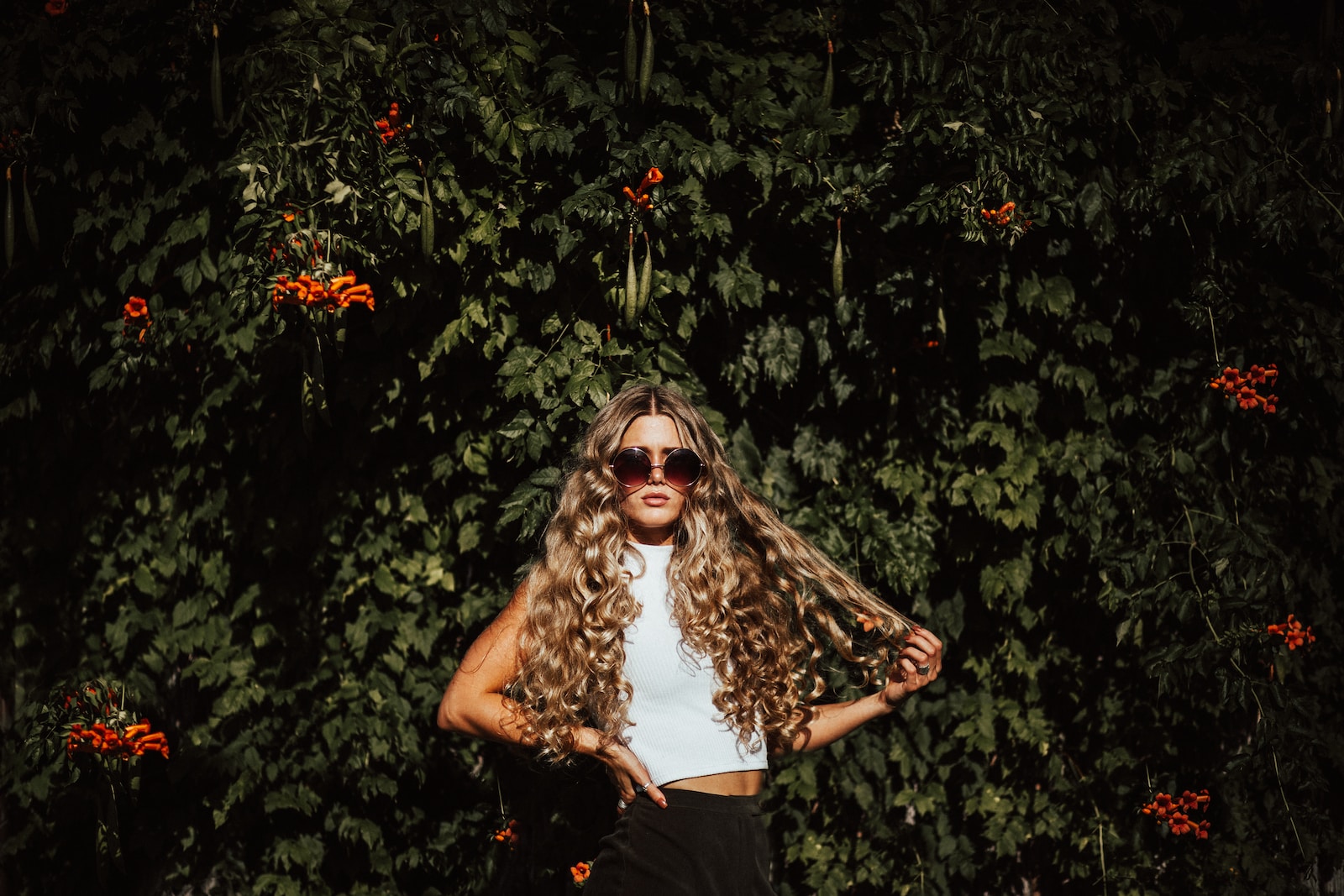
Curly hair is incredibly beautiful and can be a defining characteristic for many individuals. However, curly hair often comes with its own set of challenges, including dryness. Understanding why curly hair tends to be dry is essential to properly caring for and nourishing it. In this article, we will explore the characteristics of curly hair, common issues faced by those with curly hair, and the reasons behind its dryness.
I. Introduction
Understanding Curly Hair and its Characteristics
Curly hair is different from straight hair in several ways. The shape of the hair follicle determines whether the hair is straight, wavy, or curly. Curly hair has an elliptical or oval shape, which results in the hair strands bending as they grow. This curved structure is what gives curly hair its distinctive texture and shape.
Curly hair is also naturally drier than straight hair. This is because the natural oils produced by the scalp have a harder time traveling down each strand due to the bends and curves in the hair shaft. As a result, the hair may appear and feel dry, lacking the natural oils and moisture needed for optimal health.
Common Issues with Curly Hair
Curly hair’s structure and moisture retention challenges
Unlike straight hair, which allows oils to travel easily down the shaft, curly hair struggles with moisture retention. The bends and curves in curly hair prevent natural oils from reaching the ends of the hair, leading to dryness and frizz. This lack of moisture also makes curly hair more susceptible to damage, breakage, and split ends.
The impact of curly hair’s shape on moisture distribution
The shape of curly hair plays a significant role in how moisture is distributed throughout the strands. While straight hair allows moisture to evenly coat each strand, curly hair’s twists and turns make it more difficult for moisture to penetrate the hair shaft fully. As a result, the hair can appear dull, frizzy, and dehydrated.
The Role of natural oils and Moisture in curly hair health
Natural oils produced by the scalp, such as sebum, play a vital role in nourishing and protecting the hair. However, the structure of curly hair makes it challenging for these oils to travel from the scalp to the ends. This leaves curly hair more susceptible to dryness and lacks the necessary moisture for optimal health and vitality.
It is important to note that not all curly hair is inherently dry. Some individuals have naturally well-moisturized curly hair, while others may experience dryness due to various external factors such as harsh weather conditions, excessive heat styling, or chemical treatments. Therefore, it is crucial to understand and cater to the unique needs of your particular type of curly hair to maintain its health and prevent dryness.
To combat and prevent dryness in curly hair, it is essential to establish a proper hair care routine that includes regular conditioning, deep moisturizing treatments, and protective styling techniques. Additionally, using products specifically formulated for curly hair can help to replenish moisture and enhance the hair’s natural beauty.
In conclusion, understanding why curly hair tends to be dry is a crucial step in caring for and maintaining its health. The unique structure and characteristics of curly hair contribute to its inclination towards dryness. By incorporating the right hair care practices and products, individuals with curly hair can nourish and protect their locks, embracing their natural beauty.
II. The Science Behind Curly Hair Dryness

The Structure of Curly Hair
To understand why curly hair tends to be dry, it’s essential to know the structure of the hair shaft. The hair shaft is composed of three layers: the cuticle, cortex, and medulla. The cuticle is the outermost layer, consisting of overlapping scales that protect the inner layers of the hair. The cortex is the middle layer, which gives hair its strength, elasticity, and color. The medulla is the innermost layer, but it is not present in all hair types.
Curly hair has a unique structure that differs from straight hair. Instead of a round or oval shape, curly hair has an elliptical shape, causing it to be more prone to dryness and frizz. Curly hair also has more bends and twists along the shaft, making it more difficult for the natural oils produced by the scalp to travel down the hair strand, resulting in dryness and moisture imbalance.
Why Curly Hair is More Prone to Dryness
There are several reasons why curly hair tends to be drier than straight hair:
1. Natural Oils: The natural oils produced by the scalp, called sebum, have a harder time traveling down the curly hair shaft due to its twists and bends. As a result, the hair lacks the necessary lubrication, leading to dryness and frizz.
2. Moisture Loss: Curly hair has a higher porosity, meaning it absorbs and loses moisture more easily. Moisture can escape from the hair shaft, leaving it dry and brittle.
3. Cuticle Structure: The cuticle of curly hair is more raised and raised, making it more susceptible to damage and moisture loss. This structural difference can result in the hair’s inability to retain moisture, leading to dryness and frizz.
4. Environmental Factors: Environmental factors such as sunlight, wind, and humidity can further contribute to curly hair dryness. These external factors can strip the hair of its natural oils and increase moisture loss.
To combat curly hair dryness, it’s important to follow a proper hair care routine that includes moisturizing and nourishing products. Using sulfate-free shampoos, deep conditioning treatments, and leave-in conditioners can help restore moisture and enhance the hair’s natural texture. It’s also essential to handle curly hair gently, avoiding excessive heat styling and harsh brushing.
Understanding the science behind curly hair dryness can help individuals with curly hair take the necessary steps to maintain its health and vitality.
III. External Factors Contributing to Curly Hair Dryness
Environmental Factors (Humidity, Heat)
One of the main reasons why curly hair tends to be dry is due to external environmental factors. These factors can include humidity and heat, which can strip the hair of its natural moisture and lead to dryness. Here’s how these factors can affect curly hair:
Humidity: High humidity levels can cause the hair to absorb excess moisture from the air, making it frizzy and prone to dryness. Curly hair is more susceptible to frizz because of its unique structure, which makes it more porous and prone to absorbing moisture from the environment.
Heat: Excessive heat exposure, such as from styling tools like flat irons and blow dryers, can lead to dryness in curly hair. The high temperatures can damage the hair cuticle, leading to moisture loss and making the hair appear dry and brittle.
Hair Care Practices (Shampooing, Styling)
Hair care practices can also contribute to curly hair dryness. Here are some common hair care practices that can cause dryness in curly hair:
Lack of natural oils:
Curly hair tends to be drier because the natural oils produced by the scalp have a harder time traveling down the hair shaft due to its coiled structure. This can result in dry, brittle hair that lacks moisture.
Using the wrong hair care products:
Using hair care products that are not specifically formulated for curly hair can strip the hair of its natural oils and lead to dryness. It’s important to use products that are designed to moisturize and nourish curly hair, such as those that contain hydrating ingredients like shea butter and argan oil.
Over-washing and heat styling:
Overwashing the hair and excessive heat styling can also contribute to dryness in curly hair. Washing the hair too frequently can strip away the natural oils that moisturize the hair, while heat styling tools can damage the hair cuticle and lead to moisture loss.
To combat dryness in curly hair, it’s important to adopt a hair care routine that helps retain moisture and protect the hair from environmental factors. This can include using gentle cleansers, moisturizing conditioners, and applying leave-in treatments that help hydrate and nourish the hair.
IV. Conclusion

Embracing and Maintaining Beautiful, Healthy Curly Hair
In conclusion, curly hair tends to be more prone to dryness compared to straight hair. This is due to the unique structure of curly hair strands, which makes it more challenging for natural oils produced by the scalp to travel down the hair shaft. The lack of moisture can lead to frizz, breakage, and overall dull and lifeless-looking hair.
However, it’s important to note that having curly hair doesn’t mean you have to live with dryness and its associated problems. By following the right hair care routine and using appropriate products, you can embrace and maintain beautiful, healthy curly locks. Here are a few tips to keep in mind:
1. Hydration is Key: Make sure to drink plenty of water and stay hydrated from the inside out. Proper hydration helps promote healthy hair growth and overall hair health.
2. Moisturize, Moisturize, Moisturize: Use hydrating and moisturizing hair products specifically designed for curly hair. Look for products that contain natural oils like argan oil, coconut oil, and shea butter, as these help to seal in moisture and nourish the hair.
3. Avoid Over-Washing: Curly hair tends to be more delicate and can easily become dry with excessive washing. Limit your hair-washing routine to 2-3 times a week to preserve the natural oils in your hair.
4. Deep Conditioning Treatments: Regular deep conditioning treatments can help replenish moisture and improve the overall health of your curly hair. Look for deep conditioning masks or leave-in conditioners that provide intense hydration.
5. Protect Your Hair: When styling your hair, use heat protectants and avoid excessive use of heated styling tools. Heat can strip away moisture from your hair, leading to dryness and damage. Consider using protective hairstyles like braids or buns to minimize damage from environmental factors.
6. Gentle Handling: Avoid rough handling of your hair, such as brushing or combing when it’s dry. Use a wide-tooth comb or your fingers to detangle your curls when they are wet and apply a leave-in conditioner to facilitate the process. This helps prevent breakage and unnecessary stress on your hair.
By incorporating these tips into your hair care routine, you can combat dryness and maintain healthy, beautiful curly hair. Embrace your natural curls and make them shine with proper care and attention.
Remember, every individual’s hair is unique, and what works for one person may not work for another. It’s important to experiment with different products and routines to find what best suits your hair type and needs.
With the right care and a little love, your curly hair can become your ultimate asset, showcasing your beautiful and unique style.
